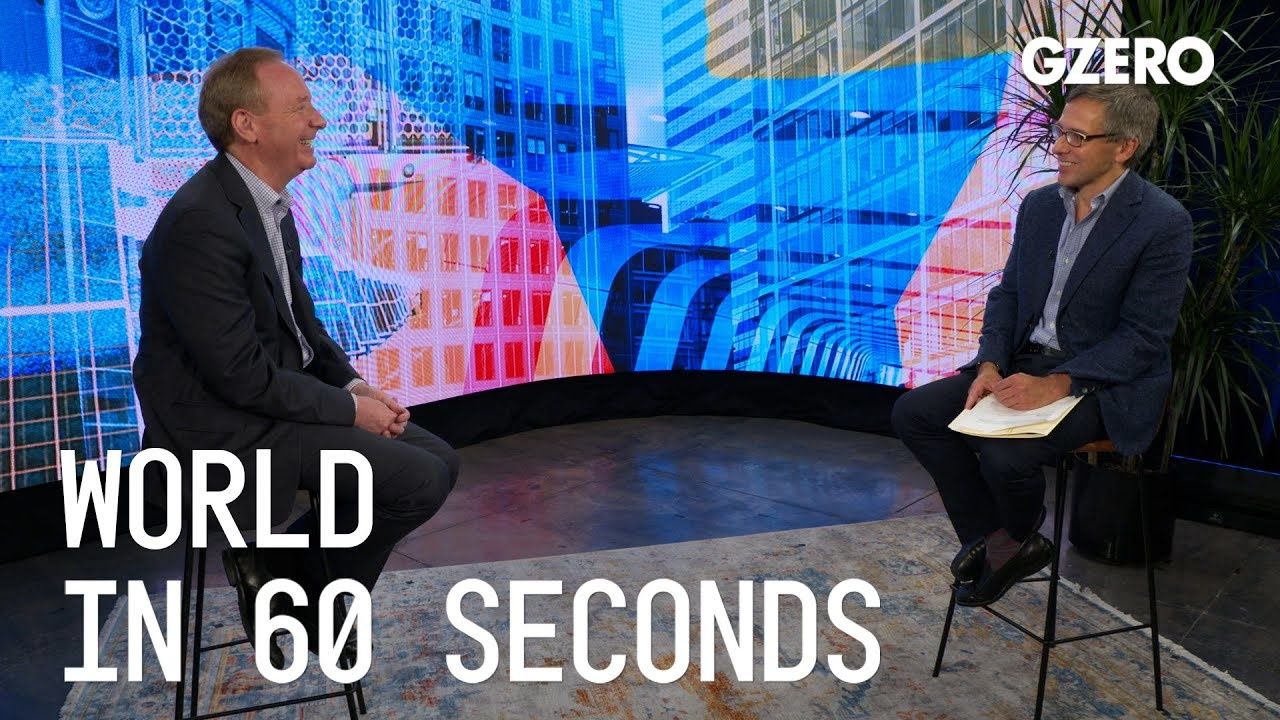Brad Smith, President of Microsoft, joins Ian Bremmer on this week's World in 60 seconds to discuss multilateralism, optimism, and the return to normal in the post-pandemic world.
Could this pandemic actually present an opportunity to bolster global support for multilateralism and what should that look like moving forward, Brad?
Brad Smith:
Well, I think it's an imperative and it has to bolster support for multilateralism for a very simple reason. We cannot afford to assume that it will be another century before we see a pandemic like this again. We have to take from this experience, all of the learning we can muster and put in place what we will need to be better prepared. And the only way we can do that is to start with an obvious fact. Viruses don't respect borders. So people have to work together across them as governments and with the kinds of support from companies and civil society that it'll take to ensure that we don't find ourselves as ill prepared a decade from now or five years from now, as we were when this year began.
Ian Bremmer:
On the one hand, there's been a lot of lack of leadership, at least internationally, the G20 doing nearly as much coming out of this crisis that we saw coming out of the 2008 financial crisis when it was founded. On the other hand, you've got supra-nationalism in Europe with the Germans and the French, and indeed unanimous votes to actually create stronger redistribution, stronger capacity and resilience of that institution. You've got the World Health Organization, the UN here working with a bunch of leaders and the private sector.
What gives you cause so far for most optimism that we actually are going to respond more effectively?
Brad Smith:
Well, I think one of the fascinating aspects of this pandemic in its own way has been the critical importance of data. We're all relying on data, literally, to manage government decisions that determine whether we get to leave our homes, where we get to go, what we get to do. But the truth is what we've also learned is that the data that is needed to address something like this needs to be measured in a consistent way across borders. At Microsoft we're doing a lot of work with the World Health Organization. Just learning from that how each individual government can be more effective if it's collaborating with others in a more unified way, putting digital technology and data to work. I think there's a lot of insight from that narrow slice that in fact impacts every part of the economy in the world today.
Ian Bremmer:
One of the things that people have been most concerned about is that the pandemic is driving borders up. It's driving people farther apart. But the fact that technology is working as well as it is right now is also unlocking human capital in terms of distance learning, in terms of telemedicine for large numbers of people that otherwise would have been left further behind in a crisis like this.
Brad Smith:
We're all learning a lot. I think tele health services are one of the great examples of where we're going to find in the future that it doesn't mean that people will no longer go to a doctor, but they'll only go to a doctor when they need to see a doctor in person.
And we'll probably live in a world where people have more consultation with health professionals because tele-health will fill-in a void, but we're also finding all the cracks in our societies. What it means when some people have broadband and others don't. Some people have access to digital skills and others don't. So it's a world of new opportunity, but if the opportunity isn't distributed more broadly, then it's going to exacerbate all the divides we already worry about in our societies.
Ian Bremmer:
What's the piece of life after coronavirus when truly people feel safe, again, that we're not socially distancing and the rest, that you think is going to be most different from life before coronavirus?
Brad Smith:
Well, I think it's going to be a more of a mixture of hybrid life. I'm not one who believes that people will want to stay in their houses forever. I think there's a lot that can be accomplished when people get together that they can't do when they're by themselves. But there's also a lot that we can do that will add convenience and efficiency and effectiveness to our lives by combining this in-person interaction with remote sort of everything, shopping, ordering food, connecting with people around the world, we have the opportunity to build sort of a richer experience. But again, only if the technology that's essential for this is within everyone's reach.
Ian Bremmer:
I also think we could get used to being six feet apart from each other for a longer period of time.
Brad Smith:
Yeah. But I still think you'll go to a sporting event, people are still going to want to be in a crowd. Go to a theater, people are going to want to be in the crowd. It will be fascinating to see how long some of these other habits persist once we're finally out of the other end of this tunnel and can look at it in the rear view mirror.
More For You
Most Popular
In this Quick Take, Ian Bremmer reacts to President Trump’s State of the Union address, calling it “a rehashing of the greatest hits” with little new policy direction.
Small business hiring surged 7% above the 2024 average in December, led by a surprise rally in retail. But with uncertainty still historically high and mounting concerns over tariffs, can this momentum survive 2026? Explore the data behind the resilience of the US small business sector. Get the latest economic insights from Bank of America Institute.
